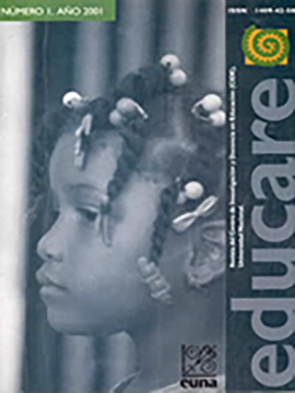Consideraciones en torno a la relación entre cultura y educación: a propósito de la producción y la reproducción cultural en la escuela
DOI:
https://doi.org/10.15359/ree.2001-1.1Abstract
This article intends to articulate the notions of culture and school from the perspective of several authors and their respective theories. This academic exercise is built upon the theoretical standpoints about culture which define it as "construction of meanings in different contexts", "cultural reproduction", cultural reproductions", "cultural appropriation", "cultural capital", "variability" and "cultural compatibility".
It is divided into four sections. The first one, introduces the notion of culture and its characteristics; the second one presents an overview of the main theories about reproduction from a "cultural resistance perspective"; the third one analyzes the role of cultural reproduction and cultural production from the standpoint of authors like Willis and Ogbu; the fourth and final section summarizes some views about the role of the school in looking for effective solutions to cultural differences through a "cultural compatibility" strategy.
References
Althusser, L. (1974) ideología y aparatos ideológicos del Estado. México:
Nueva Visión.
Baudelot, Ch. y Esmblet, R. (1975). La escuela capitalista. México:
Siglo XXI.
BonJil Batalla. G. (1981). Pensar nuestra cultura. México. Alianza Editorial
Bowles, S. y Gintis, H. ( 1981). La instrucción escolar en la Amériraca Capitalista México: Siglo XXI.
Bourdieu, P. y Passeron, J. C. (1981). La reproducción. Barcelona: Laia.
Bourdieu, P( 1993) "Los poderes y su reproducción. En: Velasoo, H. García, J. y Díaz, A. (Eds.). Lecturas de antropología para educadores. Madrid: Trona.
Cook-Gumperz, J. (1988). Introducción a la construcción social de la
alfabetización,. Madrid: Paidós
Chartier, R ( 1996). El mundo como representación. Historia cultural: entre: la práctica y la representación. Barcelona: Gedisa.
Gimeno, J ( 1989). El currículo: una reflexión sobre la práctica. Madrid: Morata.
Granja. J. (1993). Lecturas a la reproducción. DIE, México: DIE
Heath, S. (1989) ways with words. Cambridge: Cambridge University
Press.
Ogbu, J. (1987) "Variability in minority school perfomance: A problem in search of a an explanation" Antropology and Education Quaterty, 18:4.
Rockwell, E (1996). "La djnámica cultural en la escuela". En: Hacia un
currículo cultural. un enfoque vygostkiano. Amelia Álvarez y Pablo del Río (cds). Madrid: Infancia y Aprendizaje.
Rosaldo. R. (1991). Cultura y verdad: Nueva propuesta de análisis social. México: Grijalbo.
Spindler, G (1991). "La transmisión de la cultura". En: Velasco, H., García, J. y Ofaz, A. (E,ls.). Lecturas de antropologla para educadores. Madrid: Troaa.
Tharp, R (1989). "Culturally compatible education: A formula designing
effective classrooms" What the antropologist have to say about dropouts. Trueba, Henry, G and L. Spindler. Nueva York: He Falmer Press.
Published
How to Cite
Issue
Section
License
1. In case the submitted paper is accepted for publication, the author(s) FREELY, COSTLESS, EXCLUSIVELY AND FOR AN INDEFINITE TERM transfer copyrights and patrimonial rights to Universidad Nacional (UNA, Costa Rica). For more details check the Originality Statement and Copyright Transfer Agreement
2. REUTILIZATION RIGHTS: UNA authorizes authors to use, for any purpose (among them selfarchiving or autoarchiving) and to publish in the Internet in any electronic site, the paper´'s final version, both approved and published (post print), as long as it is done with a non commercial purpose, does not generate derivates without previous consentment and recognizes both publisher's name and authorship.
3. The submission and possible publication of the paper in the Educare Electronic Journal is ruled by the Journal’s editorial policies, the institutional rules of Universidad Nacional and the laws of the Republic of Costa Rica. Additionally, any possible difference of opinion or future dispute shall be settled in accordance with the mechanisms of Alternative Dispute Resolution and the Costa Rican Jurisdiction.
4. In all cases, it is understood that the opinions issued are those of the authors and do not necessarily reflect the position and opinion of Educare, CIDE or Universidad Nacional, Costa Rica. It is also understood that, in the exercise of academic freedom, the authors have carried out a rogorous scientific-academic process of research, reflection and argumentation thar lays within the thematic scope of interest of the Journal.
5. The papers published by Educare Electronic Journal use a Creative Commons License:















 The articles published by Educare Electronic Journal can be shared with a Creative Commons License:
The articles published by Educare Electronic Journal can be shared with a Creative Commons License: 



